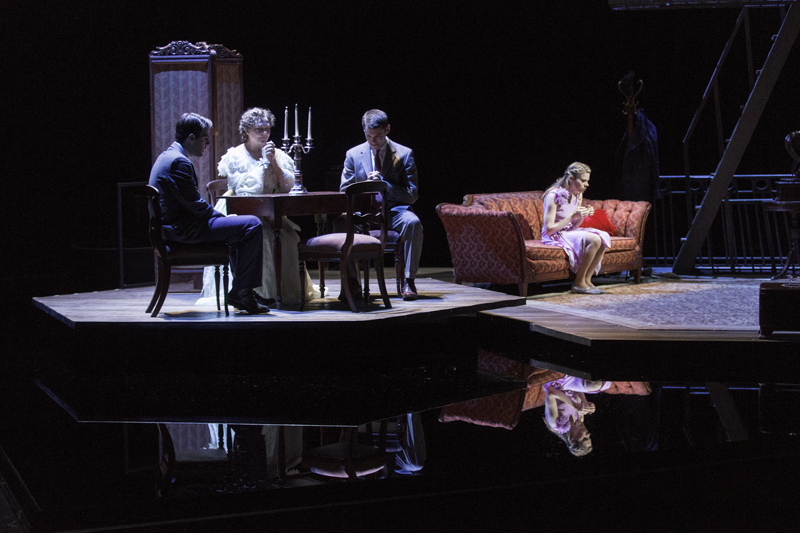Presented by American Repertory Theater
By Tennessee Williams
Directed by John Tiffany
Choreography by Steven Hoggett
64 Brattle Street, Harvard Square
Review by Gillian Daniels
(Cambridge) In Tennessee Williams’s tragicomedy, The Glass Menagerie, my sympathy has often been with the antagonist, Amanda, here played by Cherry Jones. Raised as a spoiled Southern belle given no higher goal than to be a wealthy wife, Jones’ Amanda has a sadly stunted maturity about her. She isn’t prepared to deal with life outside the Antebellum South. She’s at a loss when her children’s needs deviate so sharply from the accepted norms.
Amanda demands that Tom (Zachary Quinto) keep from feeding his sense of adventure and joining the Merchant Marines in order to provide for his quiet sister, Laura (Celia Keenan-Bolger). When Jones walks into a room, she seems to absorb all the attention in it like a flame burning up oxygen. Amanda shines while her children are absorbed into her presence. The situation, in true Williams style, is both amusing and miserable.
Well known for his cold villain on the TV series Heroes (2006-2010) and his restrained version of the alien Spock in 2009’s Star Trek film, it’s strange to watch Quinto let loose here. As Tom, Quinto devours the scenery. He initially directs his hysteria toward Amanda. The frustration he has for his mother is palpable and filtered through his drinking. As the night I saw the play progressed, however, Quinto eventually melted into his role. Still, his performance was jarring at first, as if he was still getting used to a new skin.
Celia Keenan-Bolger’s turn as Laura steals the second half of the show. When we first see her, Quinto introduces her by pulling her out of the cushions of the couch. Like a sad nightmare, she’s trapped in the corners of the life her mother has chosen. Amanda feels all the more oblivious for rushing to pair her daughter with a gentleman caller and ignore the rest of their problems.
Laura, here, doesn’t just walk with a limp but a pronounced stoop. She lurches across the stage nervously. The central metaphor compares Laura to the glass unicorn in her menagerie, a creature both unique and fragile. Here, though, it looks as if Laura has already been broken. The wounded performance is stunning.
Director John Tiffany chooses a largely empty stage to set the action, one made up to look like a dream. The stairs of the fire escape disappear upward and a reflective black surface surrounds the stage like a lake. While an interesting effect, the attempt to make the play more otherworldly than it already is happens to be unneeded. The characters are enough to move the show beyond its mundane trappings.
Despite some stumbling, American Repertory Theater’s production of The Glass Menagerie is a tight show. The actors inhabit a stark space but are thoroughly wrapped up in the worlds’ of their characters. It’s not perfect, but like Laura awkwardly moving across the stage, Tom waxing poetic, or Amanda making a grab for the limelight, the effect is absorbing.

